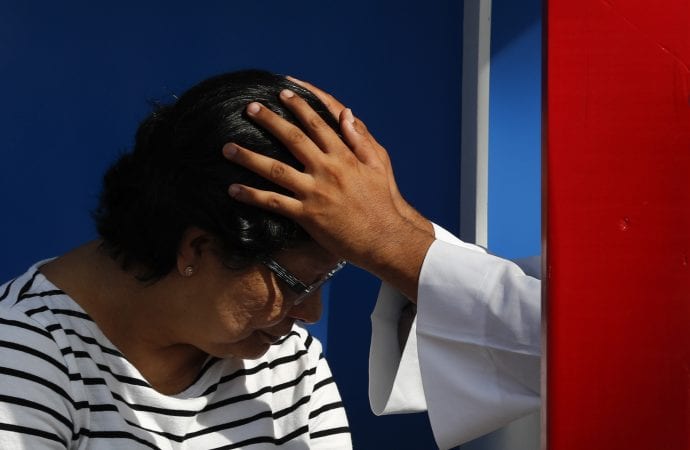California Confession Debate Pivots on How to Keep Children Safe
By John L. Allen Jr.
When I started covering the Vatican back in the 1990s, Italian journalist Vittorio Messori was a legend. He was the author of the 1985 Ratzinger Report, the book that made the future Pope Benedict XVI a global lightning rod, as well as Crossing the Threshold of Hope with Pope John Paul II in 1994. Messori is an epigrammatic guy, and I remember him talking once about stories on the Church no journalist could ever report. Among them, he said, was the story of how many atrocities in human history have been prevented by the sacrament of confession - that unique moment when, in absolute privacy, a priest has the chance to speak heart-to-heart with someone, potentially turning their life around. The memory comes to mind in light of a bill currently being debated in the California Senate, SB 360, which would effectively shred the seal of the confessional by eliminating an exemption to the stateís mandatory reporting law for ďpenitential communication.Ē California is not the only venue in which such a proposal is in the air - both Chile and Argentina, for instance, are other examples. The billís sponsor, Democratic Senator Jerry Hill of San Mateo, claims itís necessary because ďthe clergy-penitent privilege has been abused on a large scale, resulting in the unreported and systemic abuse of thousands of children across multiple denominations and faiths.Ē To state the obvious, Hillís assault on the Church is a natural byproduct of its well-chronicled failures on the clerical sexual abuse crisis, including the fallout from the Pennsylvania Grand Jury report last year as well as the scandal surrounding ex-cardinal and ex-priest Theodore McCarrick. The fact the Church has brought all this on itself, however, doesnít mean every punitive measure one can imagine is necessarily a good idea - and there are multiple reasons to conclude that Hillís proposal is a spectacularly bad one. The list begins with the obvious and egregious violation of religious freedom the bill represents. The sacrament of confession is a core element of the Catholic faith, and no state should ever be in the position of dictating doctrine to a religious community. One might also mention that targeting the Catholic Church ignores the broader context of child sexual abuse. Recently, the Schools Insurance Authority in California commissioned an audit on the potential impact of another bill currently in the legislature that would make it easier to sue public schools for child abuse. The audit used a baseline 2017 estimate from the U.S. Department of Justice that 10-12 percent of children in public schools suffer sexual misconduct by an employee at some point K-12, and estimated that under the terms of the bill the losses of the California system due to such claims could grow from $813 million over the past 12 years to $3.7 billion. Aside from that staggering dollar amount, pause for a moment to take in the idea that 10-12 percent of all public school students experience sexual misconduct or abuse. Last year there were 55.6 million young people in public elementary and secondary schools in America, which means that between 5.6 and 6.7 million children, at some point, will be the victims of abuse in public schools. Contrast that with the fact that today, after the anti-abuse measures adopted by the American Church over the past couple of decades, the nationwide average for the number of substantiated allegations of child sexual abuse by Catholic priests each year, according to the well-respected Center for Applied Research in the Apostolate at Georgetown University, is around seven. One case is too many, but the contrast between the two numbers is nevertheless arresting. The unavoidable question is whether picking a fight over confession is really the best use of public resources in terms of keeping children safe. Perhaps the most compelling point of all, however, is suggested by Messoriís comment: The sacrament of confession is not a dodge to conceal abuse; instead, itís a unique tool the Church has to prevent it and to stop it. The truth is, most predators arenít streaming into confessionals to talk about it. Theyíre masters of compartmentalization, and often donít even think theyíre doing something wrong. However, in the rare instance that a predator does present himself in confession, it represents a precious opportunity to challenge that person to stop - and, presumably, to refuse absolution if the predator canít or wonít. Itís a chance for a priest to reach inside that personís conscience, trying to fan the flames of whatever embers of regret, empathy and compassion may smolder within. The more likely scenario is that a victim comes to confession, counting on the guarantee of confidentiality, and reveals what happened because they want to talk to someone upon whose discretion they can rely completely. In that case, a priest has the chance to encourage the person to come forward, offering his accompaniment and support. Without that assurance, the odds of the victim ever making a report would be significantly reduced. Ripping away the seal of the confessional, therefore, would not promote the cause of child safety but damage it. Itís hard to see how a publicity stunt like SB 360 - however much the Church has no one to blame but itself - is worth that result, assuming the aim isnít simply to garner headlines and votes but to fight abuse.
|
.
Any original material on these pages is copyright © BishopAccountability.org 2004. Reproduce freely with attribution.
